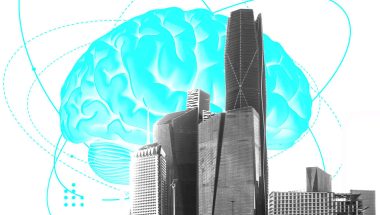How AI is powering the next wave of transformation in Saudi Arabia
Can AI drive sustainability and prepare the Kingdom for future challenges?

The world is fixated on the future, chasing the next big thing. But actual progress comes from long-term stability, not immediate gains. In Saudi Arabia, the focus is on building a foundation for tomorrow. Rather than rushing into new technology, organizations are embracing AI-driven transformation, focusing on long-term benefits, not quick fixes.
Stephen Anderson, Strategy and Markets Leader at PwC Middle East, highlights that AI is at the heart of Saudi Arabia’s Vision 2030. It plays a crucial role in achieving the Kingdom’s goals of economic diversification and technological advancement.
As part of its ongoing transformation, Saudi Arabia is steadily integrating AI into national development strategies. This continuous push to build a digitally advanced ecosystem through AI reflects the Kingdom’s unwavering commitment to becoming a global leader in innovation.
THE FUTURE TODAY
AI is central to Saudi Arabia’s Vision 2030, playing a key role in realizing the Kingdom’s goals of economic diversification and technological progress. The integration of AI across various sectors, including smart city projects, is optimizing urban planning, transportation, and public services, all of which enhance the quality of life for citizens.
The value of AI in building a resilient, future-proof infrastructure lies in its capacity to drive sustainability, optimize resource management, and ensure the Kingdom is prepared to face future global challenges. According to Anderson, this means reducing reliance on traditional industries, improving resource utilization, and fostering the development of a sustainable, innovation-driven economy.
Establishing AI research centers and development programs is essential for Saudi organizations to nurture homegrown innovation and upskill the local workforce.
These initiatives are designed to ensure the Kingdom fully leverages AI’s potential—from enhancing government services to creating digital solutions that improve the daily lives and futures of its citizens. Anderson highlights that this transformation is pivotal for securing long-term economic growth, boosting global competitiveness, and improving the efficiency and effectiveness of public services throughout the Kingdom.
SAUDI ARABIA AND AI
AI is revolutionizing healthcare, energy, and sustainability in Saudi Arabia by enabling smarter and more efficient operations. In healthcare, AI technologies, such as predictive analytics, are crucial for improving early diagnoses and patient outcomes while also alleviating the workload on healthcare professionals.
In energy management, AI helps reduce costs, enhance sustainability, and drive energy efficiency, all in line with the Kingdom’s ambitious environmental goals. Moreover, AI applications in renewable energy projects are boosting efficiency in solar power generation and minimizing environmental impact.
According to Anderson, AI applications are directly improving the quality of life for citizens and supporting the Kingdom’s long-term economic sustainability by strengthening sectors essential for growth, diversification, and environmental sustainability.
Saudi Arabia’s transformation will enhance healthcare services, optimize energy production and consumption, and further solidify its global position as a leader in sustainable development.
As Saudi Arabia embraces AI, the demand for skills in data science, AI programming, prompt engineering, and machine learning will continue to rise. Vision 2030 recognizes the need for a skilled workforce to drive this transformation, prompting significant investments in educational reform and training programs.
Initiatives such as introducing AI-focused curricula in universities and collaborating with international tech companies are essential for building a homegrown talent pool.
Anderson says, “This effort is vital for creating a sustainable economy where Saudi nationals are equipped with the skills to thrive and lead in the digital age. Ultimately, it represents a long-term investment in human capital, ensuring that Saudi Arabia can compete globally in the AI space while empowering its workforce for the future.”
INTEGRATING GENERATIVE AI
Generative AI is transforming business operations across Saudi Arabia, driving innovation in sectors like retail, manufacturing, and entertainment. By enabling the creation of new products, automating content generation, and enhancing customer engagement, AI-driven solutions are streamlining product design and personalizing customer experiences, resulting in increased efficiency and time savings.
According to a recent survey, 81% of CEOs in the Kingdom have adopted Generative AI over the past year, aligning with global trends. Looking forward, 71% of Saudi CEOs expect Generative AI to boost profitability in the next 12 months—well above the global average of 49% and 67% in the Middle East.
This widespread adoption marks a significant shift in business operations, as companies can now operate more efficiently, reduce costs, and innovate in ways that were previously unattainable, Anderson points out. CEOs in Saudi Arabia are also taking a long-term approach, with 92% expecting Generative AI to be integrated into their technology platforms within three years and 86% anticipating its integration into business processes and workflows. Additionally, 88% plan to embed it into their core business strategies, 79% into new product and service development, and 89% into workforce and skills development.
For Saudi Arabia, this momentum fuels an economy that thrives on technological progress, enabling local businesses to stay competitive globally. However, companies must strengthen their data management frameworks and invest in developing internal AI expertise to maximize these benefits. Effective integration of Generative AI will be key to sustaining growth, enhancing profitability, fostering innovation, and supporting the Kingdom’s economic diversification.
WHAT’S THE CHALLENGE?
Despite significant strides in AI, Saudi Arabia still faces challenges, including talent shortages, data privacy concerns, and integration with legacy systems. In response, the Kingdom is expanding education and training programs focused on AI and technology, aiming to develop a skilled new generation of experts.
Additionally, Saudi Arabia is refining its regulatory framework to ensure ethical and transparent AI adoption. A key step in this effort is the introduction of the Personal Data Protection Law (PDPL), which addresses data privacy issues.
Addressing these challenges is essential for the Kingdom’s AI ecosystem, ensuring the safe and effective implementation of AI across all sectors. As Anderson notes, Saudi Arabia must continue to foster a secure, dynamic AI environment that drives innovation and economic growth and prepares the country for the future digital economy.
HOW PWC CAN SUPPORT CLIENTS
Anderson shares that over the past decade, AI capabilities have been steadily developed in the region, with a particular focus in the last three years on Generative AI. This evolution has allowed for the creation of deep engineering capabilities to better support clients, and three key areas are being prioritized with Generative AI.
Firstly, national champions across the region are driving significant innovation, particularly in the development of large language models. This effort is closely tied to advancements in energy optimization, data centers, and compute power, all of which are crucial to support the broader AI transformation. A prime example is the newly announced always-on, renewable energy-powered data center in Abu Dhabi, which utilizes solar and battery technology.
Secondly, leading clients in the region are integrating AI into citizen and customer interfaces and transforming their operations. This is helping organizations streamline processes and offer more efficient services to the public.
Anderson says, “Finally, we have adopted these technologies ourselves across our 350,000 people, so we have significant practical experience in adoption, use case development, and achieving tangible outcomes.”
He adds, “Our experience with OpenAI Enterprise ChatGPT as customer zero, combined with the 10,000+ people in the region, gives us great insight and practical experience to support our clients.”








































